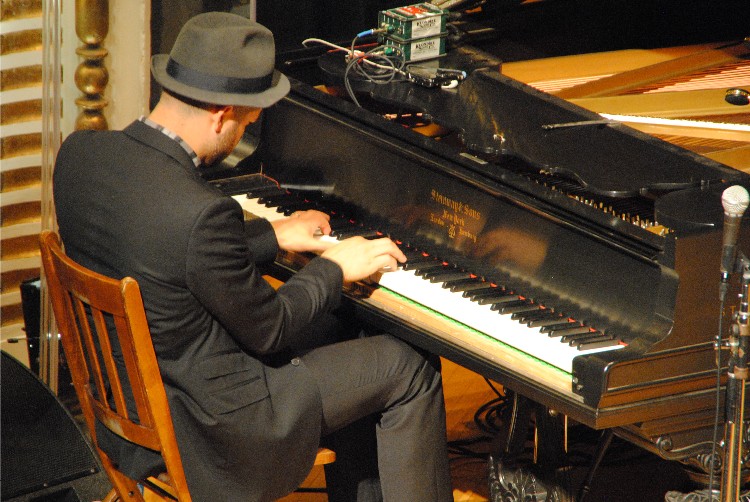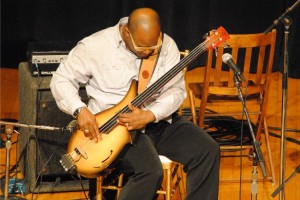Jazz Review: Jason Moran and Bandwagon Roll into Worcester, MA
In any piece, the remarkable pianist Jason Moran might go to the very edges of the harmonic movement, until he on the verge of free jazz.
Jason Moran and the Bandwagon. Presented by Music Worcester. At Tuckerman Hall, Worcester, MA, November 9.
By Michael Ullman
Before playing his first number (written by his wife, soprano Alicia Moran), the splendidly accomplished pianist Jason Moran announced that he had heard a lot about Worcester, MA. The crowd, mostly of locals dedicated to the arts, tittered nervously. They needn’t have. Moran went on to add that his teacher at the New England Conservatory, Jaki Byard, whom he described as “mentor” and “resource,” grew up in Worcester and often spoke about it lovingly.
Byard, an eclectic pianist who at the drop of a hat would interject swaths of stride piano into a bebop tune, who would play a wildly ecstatic bit of gospel music between two Ellington tunes or choose to go ‘out”, was the unseen presence of this evening’s music. At some points, Moran’s approach was guided by Byard’s spirit: the pianist said after playing Byard’s oddly titled, genially swinging tune “To Bob Vatel in Paris” he found himself playing certain downward runs he associated with his teacher. The pianist also said that Byard dictated the glissandi with which Moran opened “To Bob Vatel.” He said that they always gave him blisters.
The Bandwagon, as Moran calls it, is his trio with Tarus Mateen on bass and Nasheet Waits on drums. They’ve been together for 13 years (In 2000, Blue Note issued a disc hopefully entitled New Directions with this rhythm section and horns.) Their long and deep musical experience with each other shows In the middle of the second set, Moran turned to Waits and asked him to announce the tune the drummer wanted to play. Waits replied, that Fats Waller thing that turns into something else. (I am paraphrasing.) Oh, Moran replied, and, while his bassist looked confused, went on to play his wildly rhythmic take on Fats Waller’s version of “The Sheik of Araby,” which morphed delightfully into “I Found a Baby.” The bassist and drummer followed Moran effortlessly, jumping back and forth from a slightly antique sounding backbeat to double time.
The audience, not all of them jazz fanatics, followed the group’s flash and dash with delight. Moran is the kind of pianist who seems to charm everyone. He’s a virtuoso, whose big, two-handed technique reminds me of Oscar Peterson, a Peterson with much more challenging musical ideas than the original. Moran plays dramatically, but also with a vibrant lyricism and engaging unpredictability. He is so at ease in even the most extraordinarily difficult technical passages that he seems to have the piano surrounded.
In Worcester he played a particularly disjointed version of Waller’s “Honeysuckle Rose,” allowing Waller’s tinkling, circular, melodic phrases to emerge glassily high in the treble while wedged between blocks of chords that seemed on the verge of crushing the melody. His own compositions, including “Blue Blocks,” with which his disc Ten (Blue Note) opens, are almost as appealing. “Blue Blocks” begins with a series of chords that march downwards, finally landing on a bluesy chord. It sounds like someone collapsing onto an easy chair, but that insistent march and that welcome collapse is contrasted with the relaxed section that follows. The improvisation then works off both those descending chords and the smoother lines. It is remarkable how many ways Moran can vary those chords, each time expanding on the sweet melody they introduce.

Pianist Jason Moran — In any piece, Moran might go to the very edges of the harmonic movement, until he on the verge of free jazz. Photo: Lisa Dutton-Swain
Moran introduced the Leonard Bernstein song “Big Stuff” by playing the tape of the Billie Holiday rendition. The band joined in as the singer faded out. He invited bassist Mateen to sing an introduction to the great bluesman Albert King’s “I’ll Play the Blues for You.” This was down home music played with the greatest harmonic and melodic acuity and flexibility. In any piece, Moran might go to the very edges of the harmonic movement until he is on the verge of free jazz. His inherent musicality carries his audiences there with playful ease.
A highlight of the Worcester concert was Moran’s unusually soft-spoken version of his piece “R.F.K in the Land of Apartheid.” Live, previously in my experience, he often makes it sound like an increasingly intense chant. This night it was gentler, and seemingly more private: charming rather than penetrating. Moran has apparently infinite technical resources (except for those glissandi), a wide-ranging musical mind, lyrical panache, and a charisma that woos audiences. At one point, Moran bragged that the Bandwagon was now the house rhythm section for the Kennedy Center. It’s a good sign for American music that Washington D.C is in the hands of such fine musicians.

